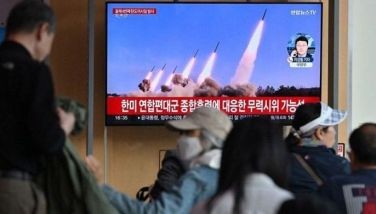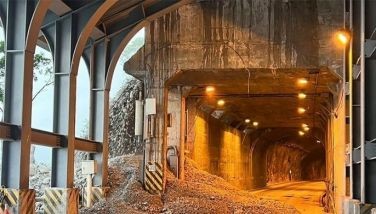US responses to NKorea nuke, missile tests will upset China
WASHINGTON — North Korean nuclear and rocket tests are drawing quick responses from the US that will upset a supposed partner against Pyongyang's weapons development — China.
New efforts to toughen South Korea's missile defense system and sanctions legislation moving swiftly through Congress could both hurt Chinese interests. The Chinese are concerned the missile defense system could be used against them, and the US sanctions could hit Chinese companies that trade with North Korea.
The US and China both oppose North Korea's development of nuclear weapons and have characterized it as an issue they cooperate on, even though China is an old ally of the North. But a Jan. 6 underground nuclear explosion and Sunday's rocket launch that world leaders called a test of ballistic missile technology have exposed stark differences between Washington and Beijing on how to deal with North Korean leader Kim Jong Un's provocations.
Beijing is reluctant to impose stiff economic sanctions, fearing a collapse of North Korea's economy and a flight of refugees across the border into China. But even if the UN Security Council can't agree on the kind of tough measures that Washington wants, the US can act on its own to pressure Pyongyang.
For some time, the US has been nudging its close ally South Korea toward allowing the deployment of the Terminal High-Altitude Area Defense, or THAAD, missile defense system on its soil. Seoul, which hosts 28,500 US forces, has been reluctant to initiate talks on the system that could hurt its improving relations with Beijing.
But soon after North Korea on Sunday launched a rocket carrying an Earth observation satellite into space, the US and South Korea announced they were looking into a possible THAAD deployment.
"We would like to see this move as quickly as possible," Pentagon Press Secretary Peter Cook told reporters Monday. He said consultations would begin within days.
China was quick to make its displeasure known. In a commentary Monday, China's state-run Xinhua news agency said a deployment could trigger a regional arms race.
"It would be unwise for the United States to act arbitrarily in disregard of international opposition just to serve its own interests of carrying out its 'Pivot to Asia' strategy," the commentary said, referring to President Barack Obama's effort to increase the US presence in the Asia-Pacific region, in part to counter the rise of China.
Cook said a THAAD deployment would be directed solely at North Korea and no other country should be concerned. But critics including Theodore Postol, a professor at the Massachusetts Institute of Technology, have said the system could help US radar spot missiles from China.
On the economic front, the US sanctions legislation could also cause discomfort in Beijing, which is North Korea's main trading partner and source of economic support.
On Wednesday, the Senate is expected to pass the North Korea Sanctions and Policy Enhancement Act that aims to expand and tighten economic restrictions to block the Kim regime's access to hard currency, targeting both North Korean entities and companies in other countries like China that deal with them.
The House of Representatives last month passed a version of the bill amid frustration that US policy has failed to stop Pyongyang's progress toward having a nuclear-tipped missile that could hit the US West Coast. The bill has strong bipartisan support in both chambers of Congress.
The legislation requires an investigation and then imposition of sanctions on any person that "knowingly" engages in prohibited activities, ranging from importing weapons technology to "cyber terrorism." In the Senate version, trading precious metals or coal that is linked to North Korea's ruling party or armed forces is also forbidden.
Marcus Noland, an expert on North Korea at the Peterson Institute for International Economics, said that measure could implicate state-owned Chinese companies which trade with North Korea. He said such companies may not do a lot of business in the US, but blacklisting them would cause diplomatic problems with China.
He said that China might even try to challenge such an action by the US at the World Trade Organization.
Joseph DeThomas, a former senior State Department official who advised on Iran and North Korea, played down expectations that new US sanctions would have a dramatic impact.
The secretive nature of North Korea's business dealings and its isolation from the world economy means that good evidence of sanctions violations is infrequent, and the evidence must then pass a rigorous, internal US government review, he said.
The executive would also have some discretion over implementation of the legislation if it is ultimately signed into law by Obama.
Still, the legislation would elevate the stakes, as the US and China, which fought on opposite sides in the 1950-53 Korean War, grapple with a North Korea which appears impervious to diplomatic pressure and intent on building a bigger nuclear arsenal.
"There are a lot of Chinese chips on the table here," said DeThomas, now professor of international affairs at Pennsylvania State University.
"Is there a way for the US and China to act together to deal with the North Korea problem or are we heading toward a parting of the ways which will pose a lot of risks to both sides?"
- Latest
- Trending































